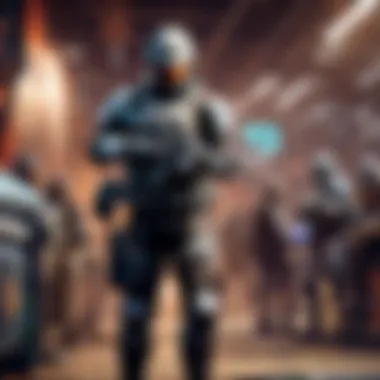Guide to Launching a Professional Gaming Team Successfully


Game Overview
In delving into the realm of professional gaming team creation, it's essential to understand the landscape of the gaming industry. Specifically focusing on the popular game Valorant, which has garnered immense popularity in the esports scene. Valorant, developed by Riot Games, introduces players to a tactical first-person shooter experience that emphasizes team coordination and strategic gameplay. The game involves two teams competing against each other with the goal of planting or defusing a spike, leading to intense and tactical confrontations.
To excel in Valorant, players must grasp the diverse set of agents available, each possessing unique abilities that can sway the tide of battle. From duelists like Jett to controllers like Viper, each agent brings a distinct playstyle and utility, requiring players to master their abilities for optimal team synergy and tactical execution.
Amidst the thriving esports ecosystem, Valorant has emerged as a prominent title in competitive gaming. The game's evolution from beta to full release marked a significant milestone, attracting a dedicated player base and establishing itself as a premier esports title.
Introduction to Valorant
Valorant embodies a blend of strategic gameplay and precise mechanical skill, offering players a competitive platform to showcase their abilities. With a focus on agent selection, map control, and team coordination, mastering Valorant necessitates a deep understanding of not only individual skills but also cohesive teamwork.
Game Mechanics and Objectives
Valorant's gameplay revolves around two teams, Attackers and Defenders, engaging in a series of rounds where the Attackers aim to plant a spike while the Defenders try to prevent the detonation. Success hinges on efficient communication, map awareness, and strategic positioning, amalgamating different playstyles and strategies for a unified objective.
Brief History of the Game
Riot Games' venture into the tactical shooter genre with Valorant marked a departure from their signature MOBA title, League of Legends. The game's development aimed to combine the precision of shooters with unique character abilities, providing an immersive and engaging gameplay experience for players around the world.
List of Playable Agents and their Unique Abilities
Valorant boasts a diverse roster of agents, each offering a distinctive set of abilities and ultimates that cater to various playstyles. From initiators like Sova to sentinels like Killjoy, understanding the intricacies of each agent empowers players to adapt their strategies and tactics accordingly, amplifying their impact in matches.
Introduction:
In the realm of esports, the landscape is ever-evolving and highly competitive. Aspiring to form a professional gaming team necessitates meticulous planning and unwavering dedication. This comprehensive guide serves as a roadmap for individuals delving into the world of pro gaming teams. From the crucial steps of team formation to securing sponsorships, comprehensive training, and orchestrating seamless competition logistics, every facet is meticulously dissected to equip you with the indispensable knowledge and tools needed to jumpstart your journey towards forging a triumphant pro gaming team.
Understanding the Esports Landscape:
The Rise of Esports:
The emergence of esports has revolutionized the gaming industry, propelling competitive gaming into a global phenomenon. The advent of digital platforms and advanced technology has fueled the unprecedented growth of esports, captivating audiences worldwide. Its intrinsic fusion of entertainment and skill-based competition has garnered a diverse following, making it an appealing choice for individuals seeking to establish a professional gaming team. However, with this meteoric rise comes the challenge of intense competition and constant evolution, requiring teams to adapt swiftly to stay relevant and excel in this dynamic arena.
Evolution of Pro Gaming Teams:
The evolution of pro gaming teams marks a significant turning point in the esports landscape. From amateur enthusiasts to highly organized and strategic units, pro gaming teams have undergone a notable transformation. The emphasis on teamwork, specialized roles, and strategic gameplay has become pivotal in the success of modern gaming teams. This evolution underscores the necessity for adaptability, resilience, and continuous improvement, as pro gaming teams strive to reach the pinnacle of success amidst fierce competition and ever-evolving gaming dynamics.
Defining Your Goals:
Setting Clear Objectives:
Setting clear objectives is the cornerstone of building a successful pro gaming team. Defined goals provide direction, purpose, and a roadmap for the team's collective efforts. By establishing clear objectives, teams can align their strategies, prioritize tasks, and measure success effectively. This clarity fosters motivation, enhances team cohesion, and facilitates strategic decision-making, positioning the team for sustainable growth and achievement in the competitive esports landscape.
Establishing Team Identity:


Crafting a distinct team identity is essential for creating a cohesive and recognizable brand within the esports community. Team identity embodies the values, culture, and ethos that define the team's character and differentiate it from competitors. By establishing a strong team identity, pro gaming teams can attract fans, sponsors, and opportunities that resonate with their unique brand image. However, the challenge lies in maintaining authenticity, consistency, and relevancy in a rapidly evolving and diverse esports environment.
Research and Analysis:
Studying Successful Teams:
Analyzing the strategies and performance of successful teams provides valuable insights for aspiring pro gaming teams. Studying successful teams allows for the identification of best practices, trends, and tactics that contribute to their achievements. By dissecting the strategies and decision-making processes of top teams, aspiring teams can enhance their own gameplay, teamwork, and strategic approach. However, the act of studying successful teams requires a critical eye, adaptability, and the ability to implement key learnings effectively to stay competitive and innovative in the rapidly evolving esports landscape.
Identifying Target Games:
Selecting the right games to focus on is a critical decision for pro gaming teams. Identifying target games with a balance of popularity, competitive viability, and long-term sustainability is vital for establishing a successful team. Different games offer unique challenges, player demographics, and viewership opportunities, impacting the team's exposure, growth, and competitive prospects. By strategically choosing target games that align with the team's strengths, interests, and market demands, pro gaming teams can position themselves for success and longevity in the dynamic and fast-paced esports industry.
Team Formation
In the realm of professional gaming teams, the formation of a team holds paramount importance. Team formation in this article encapsulates the pivotal steps involved in bringing together skilled players to create a cohesive and effective unit. When establishing a pro gaming team, specific elements such as recruitment strategies, team dynamics, and role assignments come into play. It is imperative to carefully consider the compatibility of players, the balance of skills and personalities, and the overall alignment of goals and visions within the team. This section delves into the intricacies of team formation, shedding light on the critical aspects that set the foundation for a successful pro gaming team.
Recruitment Process
Finding Skilled Players
Finding skilled players is a cornerstone of building a competitive pro gaming team. In this context, the focus is on scouting individuals with exceptional talent, game proficiency, and the ability to synergize with the team dynamic. The key characteristic of finding skilled players lies in identifying players with not only outstanding gaming skills but also strong communication, adaptability, and teamwork traits. This recruitment approach is instrumental in ensuring that the team comprises high-caliber players who can collaborate effectively towards a common goal. While the advantage of finding skilled players elevates the team's competitiveness and performance potential, it may also pose challenges in terms of player availability, personality clashes, or conflicting playstyles. Balancing these aspects is crucial for optimizing team synergy and achieving targeted results.
Assessing Team Dynamics
Assessing team dynamics plays a crucial role in team formation and functionality. This aspect involves evaluating how team members interact, communicate, and coordinate with each other during gameplay and strategizing. The key characteristic of assessing team dynamics revolves around gauging individual strengths, weaknesses, and compatibility within the team structure. Understanding the team dynamic enables team leaders to foster collaboration, resolve conflicts, and enhance overall performance through tailored strategies. The advantage of assessing team dynamics lies in cultivating a cohesive team environment that maximizes each member's potential and fosters a positive team culture. However, challenges may arise in addressing conflicts, managing differing opinions, or aligning diverse playing styles. Navigating these dynamics effectively is essential for nurturing a harmonious and efficient pro gaming team.
Team Roles and Responsibilities
Assigning In-Game Roles
Assigning in-game roles is a fundamental aspect of team organization in the realm of professional gaming. This practice involves allocating specific roles such as support, tank, or carry to individual players based on their strengths, preferences, and strategic expertise. The key characteristic of assigning in-game roles lies in optimizing team composition and gameplay strategies by leveraging each player's unique abilities and playstyles. This approach is beneficial as it promotes specialization, enhances team coordination, and enables players to focus on honing their assigned roles for maximum impact. While assigning in-game roles streamlines gameplay and fosters strategic diversity, it may pose challenges in terms of player flexibility, role adaptability, or team synergy disruptions. Balancing role assignments with player capabilities and team dynamics is essential for maintaining a competitive edge and cohesive gameplay.
Designating Team Leader
Designating a team leader is essential for ensuring streamlined communication, decision-making, and team cohesion within a professional gaming team. The key characteristic of designating a team leader lies in appointing a player who possesses strong leadership qualities, strategic acumen, and the ability to motivate and guide team members effectively. This choice is beneficial as it centralizes authority, fosters accountability, and provides a clear direction for the team's overall performance and growth. The designated team leader also serves as a liaison between players, coaches, and management, facilitating smooth operations and conflict resolution. However, challenges may emerge in balancing leadership responsibilities, addressing player concerns, or managing internal dynamics. Selecting the right team leader and supporting their leadership development is critical for optimizing team coordination and achieving long-term success.
Legal and Organizational Structure
Creating Contracts
Creating contracts is a key component of establishing the legal framework and operational guidelines for a professional gaming team. This process involves drafting comprehensive agreements that outline player rights, team obligations, dispute resolution mechanisms, and financial arrangements. The key characteristic of creating contracts lies in formalizing player-team relationships, protecting intellectual property, and clarifying expectations to mitigate potential conflicts or misunderstandings. This practice is beneficial as it instills professionalism, secures player commitments, and provides a basis for resolving contractual disputes efficiently. However, challenges may arise in drafting complex contracts, negotiating terms, or ensuring legal compliance within the esports industry's evolving landscape. Crafting clear and enforceable contracts tailored to the team's specific needs is essential for establishing a stable legal foundation and safeguarding the team's interests.
Establishing Hierarchical Framework
Establishing a hierarchical framework is crucial for defining roles, decision-making processes, and reporting structures within a professional gaming team. This framework entails outlining the chain of command, leadership responsibilities, and communication channels to streamline team operations and interactions. The key characteristic of establishing a hierarchical framework lies in promoting accountability, clarity, and efficiency in decision-making and task allocation. This approach is beneficial as it minimizes ambiguity, facilitates role clarity, and enhances team coordination by delineating authority and responsibilities effectively. However, challenges may surface in maintaining hierarchical balance, addressing power dynamics, or adapting the framework to evolving team needs. Building a flexible and adaptive hierarchical framework that aligns with the team's objectives and culture is essential for ensuring smooth operations, fostering transparency, and sustaining harmonious team dynamics.
Training and Skill Development


Training and skill development are crucial components in the journey of starting a pro gaming team. To achieve success in the competitive world of esports, a well-rounded training program is essential to hone individual and team skills, enhance performance, and strategize effectively for tournaments. By focusing on rigorous practice routines and skill-building, teams can elevate their gameplay to meet the demands of professional competitions.
Practice Regimen
Implementing a structured practice regimen is paramount for the continuous improvement of a pro gaming team. By setting specific practice schedules, teams can optimize their training sessions, allocate time efficiently for different aspects of gameplay, and track progress effectively. This emphasis on discipline and routine fosters consistency and teamwork, key elements in developing a successful esports team.
Focus on Individual and Team Skills
A key aspect of training and skill development is the focus on both individual and team skills. By dedicating time to enhance individual player abilities while also emphasizing cohesive teamwork, teams can strike a balance between personal proficiency and collective synergy. This dual approach allows players to excel in their respective roles while synchronizing their efforts for optimal team performance.
Coaching and Mentorship
In the realm of pro gaming teams, the guidance of professional coaches and experienced mentors is invaluable. Hiring professional coaches brings expertise in strategic gameplay, analysis, and performance optimization, contributing to a team's strategic edge and game comprehension. Similarly, seeking experienced mentors offers insights, motivation, and a wealth of knowledge that can shape individual players and team dynamics positively.
Hiring Professional Coaches
Professional coaches bring a wealth of experience to pro gaming teams, offering tailored coaching strategies, gameplay analysis, and psychological support. Their structured approach to training, focus on skill development, and game knowledge enhances a team's competitive readiness and performance adaptability.
Seeking Experienced Mentors
Experienced mentors provide invaluable support through their seasoned perspectives, guidance, and personal development strategies. Their mentorship cultivates a growth mindset, fosters resilience, and imparts wisdom gained through their own gaming journeys, enriching the team's strategic acumen and fostering a healthy team culture.
Analysing Gameplay
The meticulous analysis of gameplay through the utilization of game data tools and reviewing match footage is instrumental in refining strategies, identifying strengths and weaknesses, and enhancing performance consistency. By leveraging data-driven insights and visual feedback, pro gaming teams can make informed decisions, adapt their tactics, and elevate their competitive edge.
Utilizing Game Data Tools
Game data tools offer detailed analytics on gameplay metrics, player performance, and team dynamics. By utilizing these tools, teams can gain profound insights into their gameplay patterns, strategic approaches, and areas for improvement, enabling them to fine-tune their strategies and refine their gameplay for heightened performance.
Reviewing Match Footage
Reviewing match footage provides a comprehensive assessment of gameplay execution, tactical decisions, and teamwork dynamics. Teams can identify successes, pinpoint areas for development, and strategize effectively by learning from past performances. This critical analysis fosters a culture of continuous improvement and strategic evolution within the team.
Securing Sponsorships and Funding
In the competitive world of esports, securing sponsorships and funding is a critical aspect for the success of a professional gaming team. Sponsorships not only provide financial support but also offer exposure and credibility. By securing sponsorships, teams can access resources for training, participating in tournaments, and expanding their brand presence. Additionally, partnerships with sponsors can open doors to networking opportunities and collaborations within the gaming industry. When considering funding, teams must strategize on how to attract sponsors that align with their team identity and values. It's essential to develop compelling proposals that showcase the value the team can offer to potential sponsors, emphasizing the benefits of the partnership.
Building a Brand
Creating Team Identity
Creating a strong team identity is pivotal in establishing a reputable brand within the esports community. Team identity includes elements such as team name, logo, colors, and values that set the team apart from competitors. A distinctive team identity not only fosters a sense of belonging among team members but also attracts fans and sponsors who resonate with the team's ethos. By crafting a unique team identity, teams can cultivate a loyal fan base and stand out in a crowded esports landscape.
Developing Marketing Strategies
Effective marketing strategies play a crucial role in enhancing brand visibility and attracting sponsorships. Developing tailored marketing strategies that highlight the team's strengths, achievements, and values can appeal to potential sponsors. Engaging content, social media presence, and collaborations with influencers can amplify the team's reach and engage audiences. Leveraging data analytics to monitor the impact of marketing efforts and adjust strategies accordingly can optimize sponsor acquisition and brand growth.


Approaching Potential Sponsors
Crafting Sponsorship Proposals
Crafting well-structured sponsorship proposals is key to capturing the attention of potential sponsors. Proposals should clearly outline the benefits of partnering with the team, including exposure opportunities, promotional activities, and mutual goals. Highlighting the team's achievements, fan base, and marketing potential can demonstrate the value the team brings to sponsors. Tailoring proposals to the specific needs and interests of each sponsor can increase the likelihood of securing partnerships.
Negotiating Sponsorship Deals
Negotiating sponsorship deals requires a balance between maximizing benefits for the team while meeting the sponsor's expectations. Teams should prioritize long-term partnerships that align with their brand values and strategic objectives. Negotiating terms related to branding rights, exclusivity, and performance incentives can ensure a mutually beneficial collaboration. Clear communication, transparency, and professionalism are essential in building trust and fostering lasting sponsor relationships.
Utilizing Crowdfunding Platforms
Engaging with Fans
Engaging with fans through crowdfunding platforms offers a unique way to involve the community in supporting the team's endeavors. By connecting with fans on a personal level, teams can cultivate loyalty and generate enthusiasm for their projects. Sharing behind-the-scenes content, hosting exclusive events, and offering fan rewards can incentivize contributions and strengthen fan-team relationships.
Offering Exclusive Rewards
Offering exclusive rewards through crowdfunding campaigns can incentivize fans to contribute and feel valued as part of the team's success. Reward tiers can range from personalized merchandise and digital content to VIP experiences and meet-and-greets. By providing valuable and unique rewards, teams can attract backers, increase funding opportunities, and enhance fan engagement and commitment.
Tournament Participation
Participating in tournaments is a crucial aspect of establishing a pro gaming team. Tournaments provide a platform for players to showcase their skills, gain exposure, and earn recognition within the esports community. Team visibility increases through successful tournament participation, attracting potential sponsors and fans. Additionally, tournaments serve as avenues for testing strategies and improving gameplay through competition.
Event Selection
Choosing Suitable Tournaments
Choosing suitable tournaments involves evaluating factors such as skill level, prize pool, and reputation. Opting for renowned tournaments enhances a team's credibility and provides opportunities to compete against top-tier teams, aiding in skill development. It is essential to select tournaments aligning with the team's goals and capabilities to maximize growth and performance.
Understanding Tournament Formats
Understanding different tournament formats, including single-elimination, double-elimination, or round-robin, is vital for strategic planning. Each format has its unique characteristics impacting gameplay and team strategies. Choosing the right tournament format ensures the team can adapt effectively, increasing their chances of success and boosting morale.
Logistics and Travel Planning
Arranging Accommodations
Efficiently arranging accommodations for tournaments is key to ensuring player comfort and optimal performance. Choosing suitable lodging near the tournament venue minimizes travel time and reduces fatigue, allowing players to focus on their matches. Quality accommodations contribute to a positive team atmosphere and aid in maintaining peak performance.
Managing Travel Expenses
Effectively managing travel expenses is essential for budget optimization and financial sustainability. Planning transportation, accommodation, and meal costs diligently allows for efficient resource allocation. By monitoring and controlling travel expenditures, teams can allocate funds towards skill development, equipment upgrades, and other essential investments.
Performance Evaluation
Analysing Tournament Results
Analyzing tournament results provides valuable insights into team performance, strengths, and weaknesses. Understanding match outcomes helps in identifying areas of improvement and refining strategies. Utilizing data analytics tools enhances this process, enabling in-depth performance assessment and strategic adjustments for future tournaments.
Identifying Areas for Improvement
Identifying areas for improvement is critical for enhancing overall team performance. Pinpointing weaknesses in gameplay, communication, or strategy allows teams to address deficiencies proactively. Implementing targeted training sessions and seeking mentorship in identified areas empowers players to grow individually and collaboratively, elevating the team's competitive edge.



